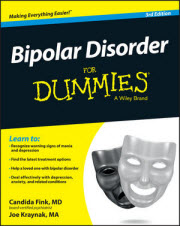February 25, 2009
By Donald Kern, author of Mind Gone Awry.
 Admitting that I had bipolar disorder has become the most important event in my life. It took more than ten years of struggle to understand what was happening with me, to accept the need for ongoing medication, and to rebuild my life.
Admitting that I had bipolar disorder has become the most important event in my life. It took more than ten years of struggle to understand what was happening with me, to accept the need for ongoing medication, and to rebuild my life.
I was 25 years old when my world first took on a grandiose flavor. Beginning to live a reality much altered from normal everyday experience, I thought myself telepathic, in touch with some higher intelligence. I was part of an army of like-minded spirits whose task was to guard the universe. Wandering the streets of San Francisco, I started making speeches to buildings – not to people, to buildings. I thought I was communicating to the executives inside.
For the next few years I lived in flophouse hotels or at times camped out in the woods. I had little money and found it difficult to work. My strong exterior, my convictions, and my self-confidence all disappeared. Finally there came a time when I had to admit I had a problem – my fantastic reality was not real. I needed treatment and made an appointment with a psychiatrist.
The straight and narrow path of working a forty-hour week and trying to fit in soon became a part of my odyssey. I would only backslide when the doctor took me off medication, and I would become manic again, no longer able to do meaningful work. On and off medication (in those days psychiatrists did not leave you on indefinitely) I started on what was to be a ten year journey toward stabilization.
At first, getting better meant being non-delusional, rational. While this required being on medication, it felt somehow separate. I found myself enveloped in a flat reality, devoid of meaning or charm. Being on medication seemed to suck the excitement out of life. It all simply seemed futile as I went from a life of bright colors and subtle pastels into a murky grey. I found that the only way out of the bleak everyday my life had become was to fabricate a goal, to attain something to make it worth continuing instead of giving up.
Today, I am a licensed psychotherapist, treating clients who are bipolar, and have started a blog Bipolar By Chance. Though continuing on meds, a zest for life has returned. I have found a common theme regarding an awakening to mental health. It is that by being able to let go of the highs of manic episodes and knowing that cycling is inevitable, help is there and available through medication compliance. That and the return to a healthy work ethic has put me on a solid road to recover. While difficult to grasp in the beginning, letting go leads to a steadiness which was never there before. Normalcy opens the door to hope.
Now, I take my medication and go on with my life, accepting inevitable problems, bumps, and curves in the road. I want to continue feeling right about myself. As I play out my role of educator and counselor, I still wrestle with a fear that lies beneath the surface. Because, you see….I know. I’ve been there, and am aware of what goes with the territory.
Donald Kern is the author of Mind Gone Awry – a bipolar memoir. You can find out more about Donald Kern and his practice at KernTherapy.com.

You ARE a SUPERSTAR! Thanks for the inspiration–I’ve always know that I should write my story. I’m 54 diagnosed at 19 with bpI. Hang in, man. lisa
Thank you for this! I’m struggling with my own diagnosis at 25 (diagnosed with a mood disorder NOS at 16, but I’m pretty sure I’m bipolar, right now the current diagnosis is cyclothymia) but I’ve been struggling with the ups & downs of grad school and my current degree I’m working on is in counselor’s education. I eventually want to be a school counselor or a creative arts therapist, but I didn’t know if I could do it struggling with this problem. But I figure if you can do it, maybe I can too. Maybe it’s worth the blandness of being flat to not have the extremes and be able to function..